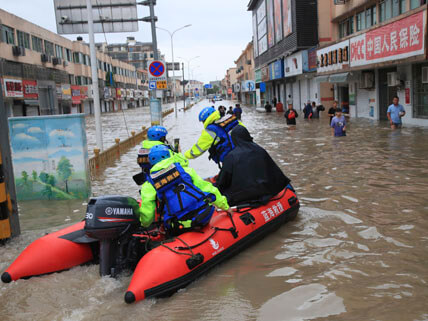
Firefighters help citizens with their vehicles and safety as Typhoon In-fa brought heavy rainstorm and caused flood water in Ningbo city, east China’s Zhejiang province, 26 July 2021.
Climate scientists have been raising alarms about global warming for years. Average temperatures on Earth have risen about 2°F since the late 1800s, with most of this temperature rise happening in the last 40 years. In fact, the last 4 years (2016–2020) have seen the highest average temperatures ever recorded. While global warming is a natural trend, most scientists believe that human activity, particularly the burning of fossil fuels, has accelerated global warming to unnatural levels.
One of the main effects of this acceleration in warming has been an increase in extreme weather. So far this year, places in the United States and around the world have experienced deadly heatwaves, massive wildfires, and epic floods.
In late June 2021, high temperatures enveloped the northwestern United States and western Canada. Scientists blame this extreme heatwave on a weather phenomenon known as a heat dome. A heat dome forms when air currents stop or stall hot ocean air. These air currents shifted north in June, creating conditions for a heat dome in the Northwest and western Canada.
In Portland, Oregon, temperatures reached a blistering 116°F. Normally, the high temperature for Portland in June is 73°F. Nearly 200 Americans and 500 Canadians died from the extreme temperatures. While heat domes in these areas are rare, they have occurred in the past. However, many scientists believe that the intensity of this heat dome, and its tragic consequences, would not have been possible without global warming.
Another effect of an increase in average temperatures in some regions is the threat of wildfires. Hot, dry conditions have contributed to massive wildfires around the world. As of mid-July, there were more than 80 large wildfires burning more than 1 million acres in the western United States. One of the largest, the Bootleg fire in Oregon, is the size of the city of Los Angeles. Siberia in Russia, a region famous for its extreme cold, is also battling massive wildfires that cover more than 1 million acres. In fact, due to unusually hot temperatures, much of Russia is under threat of wildfires.
While some regions of the world burn, others have experienced flooding on an epic scale. In general, warmer temperatures bring more moisture to the atmosphere, which in turn means more storms that are more intense. In mid-July, storms brought what would normally be two months of rainfall in just two days to parts of Germany. This caused rivers to swell and burst their banks, creating epic flooding. More than 200 people lost their lives in the flooding.
Record-breaking rainfall in China has also led to devastating flooding. Over three days, storms dropped about one year’s worth of rainfall in Henan Province. The flooding that resulted from the record rainfall has forced more than one million people from their homes. More than 90 people lost their lives in the China flood and 5 are still missing.
Many climate scientists had expected an increase in extreme weather. However, many scientists were surprised by the frequency and intensity of the events we’ve witnessed so far in 2021. As extreme weather continues to batter regions around the world, it is becoming clear that more action to combat climate change and global warming is needed, and the sooner the better.
Image credit: © Zhang Peijian/Imaginechina/AP Images
Sources
- The Effects of Climate Change
(Source: NASA; accessed July 30, 2021) - Record-breaking US Pacific north-west heatwave killed almost 200 people
(Source: The Guardian; accessed July 30, 2021) - What is a heat dome? Extreme temperatures in the Pacific Northwest, explained
(Source: CBS News; accessed July 30, 2021) - What is a heat dome?
(Source: AccuWeather; accessed July 30, 2021) - Scientists are worried by how fast the climate crisis has amplified extreme weather
(Source: CNN; accessed July 30, 2021) - More than 80 wildfires rage across western US – video report
(Source: The Guardian; accessed July 30, 2021) - Siberia wildfires: Russia army planes and thousands of firefighters battle blazes
(Source: The Guardian; accessed July 30, 2021) - What is causing the floods in Europe?
(Source: The Guardian; accessed July 30, 2021) - Germany floods: 155 still missing as hopes of further rescues fade
(Source: The Guardian; accessed July 30, 2021) - Record-Breaking Flooding In China Has Left Over One Million People Displaced
(Source: NPR; accessed July 30, 2021) - Extreme weather renews focus on climate change as scientists update forecasts
(Source: Reuters; accessed July 30, 2021) - Frequency, Intensity of Extreme Weather Surprises Climate Scientists
(Source: Voice of America News; accessed July 30, 2021)



